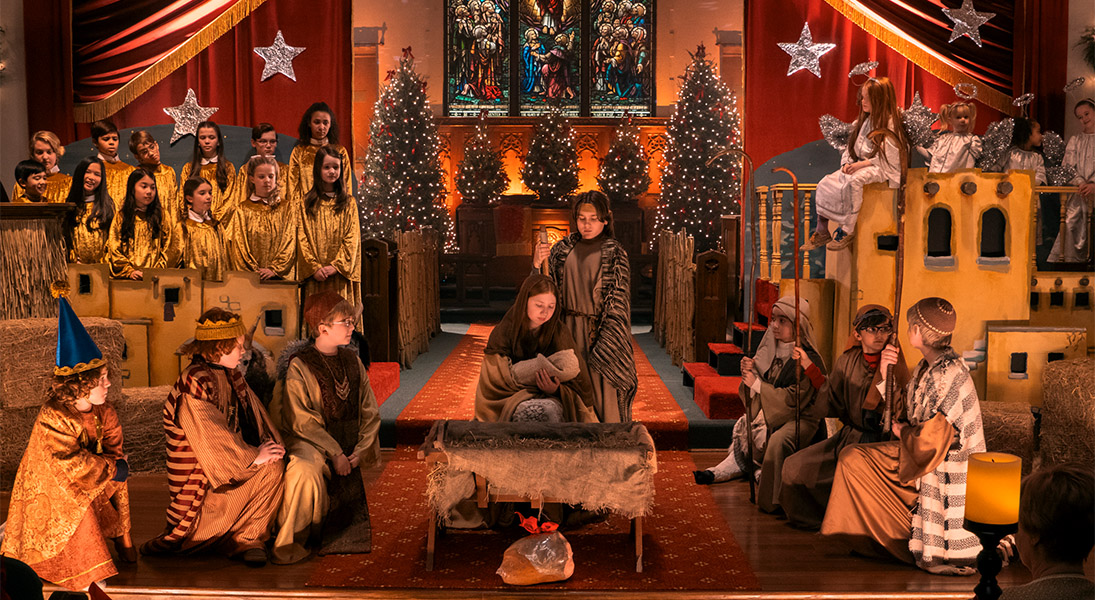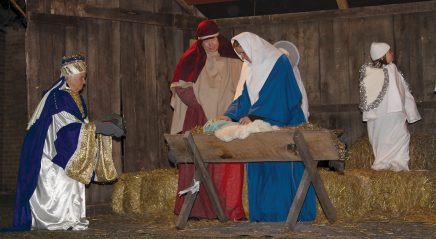No one should be shocked to learn that the narrator of The Best Christmas Pageant Ever begins its last scene by declaring, “It really was the best Christmas pageant ever.” Based on the 1972 novel by Barbara Robinson, the new theatrical feature film announces itself right away as safe and pleasant holiday viewing.
Pageant follows the much-anticipated 75th staging of an annual Christmas pageant in the small town of Emmanuel. When an accident prevents the show’s overseer from continuing her role, goodhearted Grace Bradley (Judy Greer) volunteers to keep the show going. Grace receives nothing but scrutiny and skepticism for her trouble as her fellow churchgoers worry about her ability to keep up the production’s high standards. Worse, she allows town ne’er-do-wells the Herdmans not only to join the play but also to take all the main roles, with eldest children Imogene (Beatrice Schneider) and Ralph (Mason D. Nelligan) as Mary and Joseph.
Much of the movie’s heart and humor comes from the way Grace deals with the Herdmans’ uncouth behavior. They break into fights at any second; they come to practice with wild and unkempt hair; they don’t even know the Christmas story. Yet Grace and her daughter, Beth (Molly Belle Wright, with Lauren Graham narrating the film as adult Beth); son, Charlie (Sebastian Billingsley-Rodriguez); and husband, Bob (Pete Holmes), persevere, learning the true meaning of Christmas along the way.
Some may roll their eyes at that description, dismissing The Best Christmas Pageant Ever as obvious and simple. Those detractors wouldn’t be wrong, but they wouldn’t be saying anything noteworthy either. Director Dallas Jenkins, creator of the TV series The Chosen, and his trio of screenwriters—Ryan Swanson, Platte Clark and Darin McDaniel—don’t set out to challenge the audience. Instead they’ve created something safe and obvious.
The film makes for pleasant holiday viewing, but its safeness might bother anyone who takes seriously its message about Christmas.
The movie’s safety isn’t a bad thing necessarily. Greer, a veteran of TV sitcoms such as Arrested Development and Two and a Half Men, and Holmes, a standup comedian, know how to land the gags. Cinematographer C. Kim Miles creates handsome shots, even if he doesn’t venture outside of keeping the primary characters in center frame, for maximum simplicity.
Pageant’s safeness might bother anyone who takes seriously its message about Christmas. Beth receives vitriol about her casting of the Herdmans precisely because the kids aren’t seen as “the right type of people.” Their rough manners and low-income existence make them eligible for the church’s charity, as demonstrated by the holiday ham Bob delivers each year, but less likely for church membership. By pushing against those assumptions, Beth and the Herdmans help the congregants remember that God chose to become incarnate in the form of the lowly and despised.
One-note as the movie’s snotty churchgoers might be, they do represent an attitude many people will understand, even at Christmastime. Despite hearing that God abandoned comfort to become a person, we choose comfort, safety and privilege. That’s why Elizabeth Eaton, presiding bishop of the ELCA, used her 2020 Christmas message to remind us of the disruption that’s as much a part of the Christmas story as the promise of God’s presence. “Precisely in our distress, in our dislocation, the Lord shows up,” she declared. “Emmanuel—God with us—makes his home in the very places we find foreign or isolating.”
The Best Christmas Pageant Ever avoids anything distressing, dislocating, foreign or isolating. As such, it makes for pleasant Christmas viewing, maybe as a yearly tradition. But to those who can see the message beyond its safe and comforting aesthetics, the movie also has the potential to push viewers to consider the deeper, and more dangerous, meaning of Christmas.










